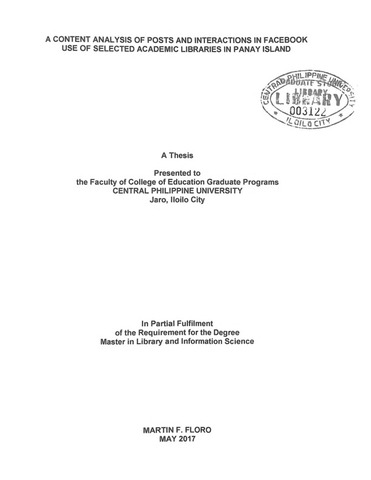A content analysis of posts and interactions in Facebook use of selected academic libraries in Panay Island

Page views
721Date
2017Auteur
Thesis Adviser
Defense Panel Chair
Share
Metadata
Afficher la notice complète
Résumé
This study was conducted to describe and analyse the contents of Facebook posts, feedbacks/reactions to the posts and interactions between the librarian or Facebook administrators and reactors among academic libraries with Facebook accounts in Panay Island, Western Visayas, Philippines.
Frequency, types and themes of the posts were identified and classified through recording, coding, evaluating and categorizing by evaluative examination. A total of 354 Facebook posts were retrieved and recorded the Facebook pages of the 14 academic libraries from June to December 2016).
The findings show that most of the 14 academic libraries were located in main campuses of the institutions in the city. The libraries had at least one to two professional librarians, and one to two staff. Most of the libraries started using Facebook as an additional services in 2015-2016, the rest in 2013-2014.
Of the 354 posts recorded, most were made in November during the celebration of National Library Information Month and the National Book Week. The main themes recorded from the purposes of Facebook posts were to share knowledge or establish links, to promote activities or upcoming events of libraries, to disseminate information through announcement and updates of libraries facilities, and to promote the collection and information resources. The most dominant theme of the posts retrieved was sharing of knowledge or link, close followed by activities or events of libraries and announcements. Apparently Facebook is used by libraries to promote and market their library services and to update their clientele of library activities or events.
The most widely used medium in the posts was a combination of photo and text.
The most common type of feedback the posts got was “likes”. Comments were few and usually short. Some feedbacks were irrelevant and not directly related to the post being reacted to.
Apparently, interactions and engagements between librarians and users was low. Feedbacks from library users or reactors to posts were brief. Most were expressed in “Likes,” and “Emoticons” or faces showing different emotions. The use of words, phrases and “jejemon” symbols or expressions was common. Interactions and exchange or ideas were usually informal, either in the dialect (Hiligaynon) or a combination of the vernacular and English even when the posts were in formal format or language. The use of abbreviated words or wrongly spelled words was also common.
The interactions were usually short exchanges of ideas. There were also more emoticons than phrases or sentences used to express ideas or answers to queries. Feedbacks were classified into relevant and irrelevant, positive or negative, and complimentary or not complimentary, and the findings showed that most feedbacks were positive and relevant, although there were also irrelevant and meaningless posts received.
A “test” inquiry sent to the 14 libraries elicited quick responses from those who frequently updated their Facebook pages. The same libraries also immediately responded to queries posted by clients. Most of the feedbacks or questions were answered in less than a minute by the Facebook administrator, as long as the administrator is on-line.
From the findings of this study, it can be surmised that Facebook is an effective tool in promoting and disseminating information about library services and resources. Creative and interesting post can attract users and effectively promote the importance and value of the libraries to library clientele.
Description
Abstract only
Suggested Citation
Floro, M. F. (2017). A content analysis of posts and interactions in Facebook use of selected academic libraries in Panay Island (Unpublished Master’s thesis). Central Philippine University, Jaro, Iloilo City.
Type
ThesisSujet
Keywords
Department
School of Graduate StudiesDegree
Master in Library and Information ScienceShelf Location
GSL Theses 020.72 F665
Physical Description
93 leaves


